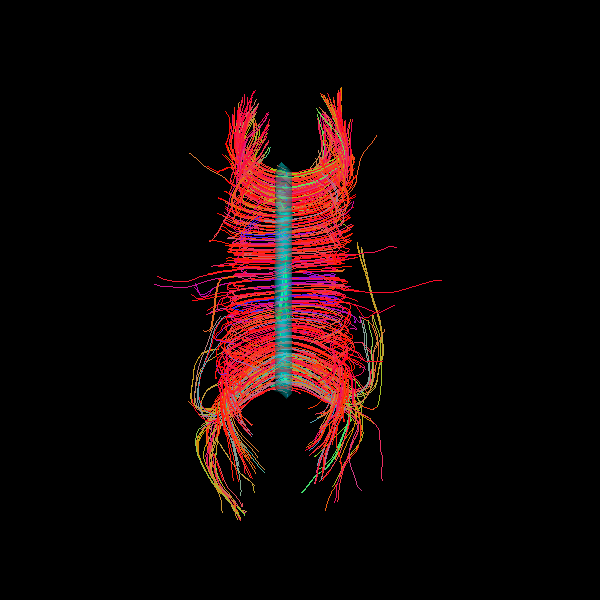Note
Go to the end to download the full example code
Visualization of ROI Surface Rendered with Streamlines#
Here is a simple tutorial following the probabilistic CSA Tracking Example in which we generate a dataset of streamlines from a corpus callosum ROI, and then display them with the seed ROI rendered in 3D with 50% transparency.
from dipy.data import default_sphere, read_stanford_labels
from dipy.direction import peaks_from_model
from dipy.reconst.shm import CsaOdfModel
try:
from dipy.tracking.local import (
LocalTracking,
ThresholdTissueClassifier as ThresholdStoppingCriterion,
)
except ImportError:
from dipy.tracking.local_tracking import LocalTracking
from dipy.tracking.stopping_criterion import ThresholdStoppingCriterion
from dipy.tracking import utils
from dipy.tracking.streamline import Streamlines
import fury
First, we need to generate some streamlines. For a more complete description of these steps, please refer to the CSA Probabilistic Tracking Tutorial.
hardi_img, gtab, labels_img = read_stanford_labels()
data = hardi_img.get_fdata()
labels = labels_img.get_fdata()
affine = hardi_img.affine
white_matter = (labels == 1) | (labels == 2)
csa_model = CsaOdfModel(gtab, sh_order_max=6)
csa_peaks = peaks_from_model(
csa_model,
data,
default_sphere,
relative_peak_threshold=0.8,
min_separation_angle=45,
mask=white_matter,
)
classifier = ThresholdStoppingCriterion(csa_peaks.gfa, 0.25)
seed_mask = labels == 2
seeds = utils.seeds_from_mask(seed_mask, density=[1, 1, 1], affine=affine)
# Initialization of LocalTracking. The computation happens in the next step.
streamlines = LocalTracking(csa_peaks, classifier, seeds, affine, step_size=2)
# Compute streamlines and store as a list.
streamlines = Streamlines(streamlines)
We will create a streamline actor from the streamlines.
streamlines_actor = fury.actor.line(streamlines, fury.colormap.line_colors(streamlines))
/opt/homebrew/Caskroom/miniforge/base/envs/py311-fury/lib/python3.11/site-packages/sphinx_gallery/gen_rst.py:722: UserWarning: We'll no longer accept the way you call the line function in future versions of FURY.
Here's how to call the Function line: line(lines_value, colors='value', opacity='value', linewidth='value', spline_subdiv='value', lod='value', lod_points='value', lod_points_size='value', lookup_colormap='value', depth_cue='value', fake_tube='value')
exec(self.code, self.fake_main.__dict__)
Next, we create a surface actor from the corpus callosum seed ROI. We provide the ROI data, the affine, the color in [R,G,B], and the opacity as a decimal between zero and one. Here, we set the color as blue/green with 50% opacity.
surface_opacity = 0.5
surface_color = [0, 1, 1]
seedroi_actor = fury.actor.contour_from_roi(
seed_mask, affine, surface_color, surface_opacity
)
/opt/homebrew/Caskroom/miniforge/base/envs/py311-fury/lib/python3.11/site-packages/sphinx_gallery/gen_rst.py:722: UserWarning: We'll no longer accept the way you call the contour_from_roi function in future versions of FURY.
Here's how to call the Function contour_from_roi: contour_from_roi(data_value, affine='value', color='value', opacity='value')
exec(self.code, self.fake_main.__dict__)
Next, we initialize a ‘’Scene’’ object and add both actors to the rendering.
scene = fury.window.Scene()
scene.add(streamlines_actor)
scene.add(seedroi_actor)
If you uncomment the following line, the rendering will pop up in an interactive window.
interactive = False
if interactive:
fury.window.show(scene)
# scene.zoom(1.5)
# scene.reset_clipping_range()
fury.window.record(scene, out_path="contour_from_roi_tutorial.png", size=(600, 600))

/opt/homebrew/Caskroom/miniforge/base/envs/py311-fury/lib/python3.11/site-packages/sphinx_gallery/gen_rst.py:722: UserWarning: We'll no longer accept the way you call the record function in future versions of FURY.
Here's how to call the Function record: record(scene='value', cam_pos='value', cam_focal='value', cam_view='value', out_path='value', path_numbering='value', n_frames='value', az_ang='value', magnification='value', size='value', reset_camera='value', screen_clip='value', stereo='value', verbose='value')
exec(self.code, self.fake_main.__dict__)
Total running time of the script: (36 minutes 53.694 seconds)
